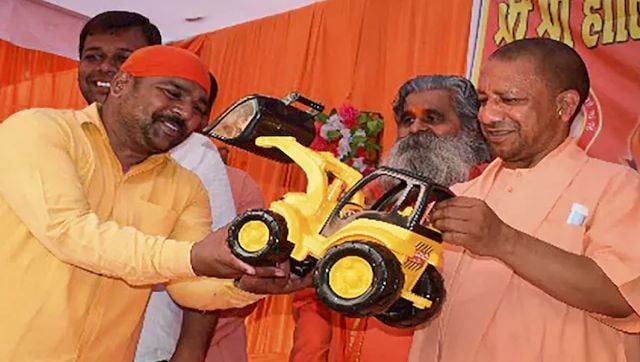“How can a house be demolished just because he is accused? Can’t be demolished even if he’s a convict. Even after telling SC Bar is … we don’t find any change in attitude.” The Supreme Court issued these stern words today (September 2) hearing a petition challenging bulldozer action against accused individuals in various cases.
The bench of
Justice BR Gavai and Justice KV Viswanathan stated that no property can be demolished just because the accused is involved in a criminal offence. “Even if he is a convict, still it can’t be done without following the procedure as prescribed by law,” said the Supreme Court.
The apex court added that it proposed to lay down certain guidelines on a pan-India basis so that concerns about the issues are taken care of.
The court, however, clarified it wasn’t defending illegal constructions. “We will not protect any illegal structure obstructing public roads, that includes a temple, but there should be guidelines for demolition.”
But what exactly is bulldozer justice? How did it emerge in India? And which states have dabbled in it?
What is ‘bulldozer justice’?
‘Bulldozer justice’, also known as bulldozer politics, refers to the practice of using the heavy-duty piece of machinery to demolish houses of alleged criminals, communal violence rioters and accused criminals.
As part of ‘bulldozer justice’, houses, shops and small establishments have been bulldozed across India, especially in the states of Uttar Pradesh, Delhi, Madhya Pradesh, Gujarat, Assam and Maharashtra.
However, the practice has come under strong criticism, with many questioning how the action can be taken even before allegations against a person are proven. They have also questioned why the administration must punish the whole family for the crime of one.
When did bulldozer justice first emerge?
In September 2017, a few months after he became the chief minister of Uttar Pradesh, Yogi Adityanath, issued a warning about using bulldozers against those involved in crime. He was then quoted as saying, “My government will bulldoze houses of anyone even thinking of perpetuating crime against women and weaker sections of the society.”
In the following years, several properties were razed by the Adityanath government, including those linked to gangster-turned-politician Mukhtar Ansari. It is reported that after coming to power, Yogi with the help of bulldozers freed up over 67,000 acres of government land from the clutches of land mafia in the state.
Soon, the UP chief minister earned the nickname of ‘Bulldozer Baba’, through which he attempted to convey his “no-nonsense” hard taskmaster style of working. Interestingly, in the 2022 Uttar Pradesh Assembly elections, it became a part of the BJP’s campaigning strategy to reiterate Yogi’s ‘bulldozer’ credentials, with top leaders making it a point to declare how the “illegally acquired properties of criminals like Mukhtar Ansari and Atique Ahmad” were brought under the bulldozer.
And when the BJP stormed to a second consecutive win in the 2022 polls, many BJP workers celebrated the
party’s triumph with bulldozers.
How did ‘Bulldozer justice’ become a national trend?
It was in May 2022 that ‘bulldozer justice’ grabbed national headlines. Back then, Nupur Sharma, the then-spokesperson of the BJP had made offensive remarks about Prophet Muhammad during a TV debate.
Her comments angered a few Muslims, who then carried out protests. It was after these demonstrations, which also turned violent, that the UP government carried out state-wide demolitions. The state claimed that the demolitions were part of a drive to remove “illegal” structures from the state.
But ‘bulldozer justice’ hasn’t been restricted to UP alone. In 2022, Madhya Pradesh’s former Chief Minister Shivraj Singh Chouhan turned into ‘bulldozer mama’ when he ordered authorities to demolish 16 houses and 29 shops across four locations in Khargone following communal clashes.
In Delhi, ‘bulldozer justice’ was on display in April 2022 following the communal clashes in North West Delhi’s Jahangirpuri. On the orders of the BJP-led North Delhi Municipal Corporation, seven bulldozers were sent in to raze parts of several structures, including the gate of a mosque. At the time, officials had stated that the demolitions were a “regular exercise” against illegal encroachments, targeting only temporary structures. The drive led to Communist Party of India (Marxist) leader
Brinda Karat reaching the spot and blocking the drive from going on any further.
And as recently as January, the Maharashtra authorities resorted to bulldozer politics in Mumbai’s Mira Road suburb, two days after the area saw communal clashes. Police reported that 15 “illegal” properties were razed.
In Haryana’s Nuh too, bulldozer justice was also on display, days after communal violence broke out, killing six people. The then Manohar Lal Khattar government demolished scores of homes and other structures.
What do critics say about bulldozer politics?
‘Bulldozer justice’ has received its fair share of criticism with many questioning the validity of these demolitions. Justice Madan B Lokur, former judge in the Supreme Court. “Bulldozer justice is contrary to all canons of law. A person’s home cannot be demolished only because he has participated in communal violence or a riot or committed some illegal act,” he has been quoted as saying.
In 2023, the Supreme Court had raised concerns over the UP government’s actions regarding bulldozing houses.
Additionally, in February, the Madhya Pradesh High Court pulled up the local administration of Ujjain for demolishing a property without complying with the principles of natural justice and law. It stated, “It has become fashionable for the local administration to demolish any house by drawing up proceedings, without complying with the principle of natural justice, and publicise the demolition in the papers.”
With inputs from agencies
Link to article –
‘How can house be demolished’: What is ‘bulldozer justice’ that Supreme Court has come down on?

